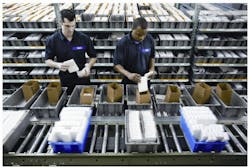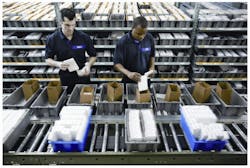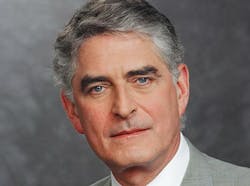Vistage said its CEO Confidence Index dropped to 87.0 in the 4th quarter of 2012, down from 89.0 in the 3rd quarter and lower than the 98.8 index posted in 4th quarter of 2011. The firm’s survey – conducted between December 10 and December 19 last year of some 1,601 chief executives across the U.S. – also found that CEOs anticipated overall economic conditions would remain subdued in the first half of 2013.
Economic and political uncertainty was voiced by nearly half of all CEOs when asked to identify the most significant business issue they are now facing, with at least one-in-four firms reported that concerns about the fiscal cliff and Washington's continued gridlock had already caused them to reduce their investments and number of new hires, Vistage’s polling discerned."The inability of Washington's political leaders to work together only fuels continued uncertainty,” noted Vistage CEO Rafael Pastor (at right). “Yet again, small business leaders are left to wonder if they'll receive any longer-term certainty from the President and the Congress about the key factors that help drive increased consumer spending, investment, productivity, and job growth."
Despite the avoidance of the fiscal cliff, CEOs polled by Vistage continue to foresee a slow pace of growth in 2013 because of the ongoing uncertainty about the impact on our economy of raised taxes on higher-income earners and of expected continued regulatory burdens, as well as the still-looming concerns about the federal deficit and debt ratings.
None of this should come as a shock to truckers, of course. The wonder is that many in business community are attempting to be optimistic about the situation, as I noted in an earlier post. Also, too, many analysts think such sluggish conditions may actually favor trucking in many respects.
Jumping back to the Vistage survey, the firm analyzed its findings to highlight four key business trends that will take shape in the early part of 2013:
- Uncertainty Slows Economic Growth:Current economic conditions rebounded from the midyear lull, as twice as many firms reported recent gains as losses. Nonetheless, just 35% of firms at year-end reported improving conditions, down from 60% at the start of 2012. Overall, 30% expected a weaker economy in 2013 compared with 26% who expected stronger economic growth. The main issue hampering stronger growth is the political and economic uncertainty caused by the ongoing saga in Washington.
- Cautious Hiring Plans: Planned payroll additions fell to 45% in the 4th quarter 2012, down from 49% in the 3rd quarter and 55% in last year's 4th quarter survey. Most of the shift has been toward keeping the number of employees unchanged as just 11% expected to reduce their staffs. While the proximate cause is an anticipated slowdown in revenue growth, uncertainty about federal tax and spending policies has been the central cause for lower growth prospects.
- Investment Plans Weaken:Planned investments in new plant and equipment declined, with the percent that planned to reduce spending rising to 20% in the 4th quarter, up from 15% in the prior quarter and the highest level since mid 2009. Not only did 32% report cutting their spending due to the looming fiscal cliff, but 22% would cancel ongoing investments if no resolution was reached by the end of February.
- Revenue and Profit Slowdown:Two-thirds of all firms anticipated revenue growth during the year ahead in the 4th quarter survey, although only slightly below the prior two quarters, it was down 10 percentage points from last year. Profits were anticipated to increase by 49% of all firms, down from 52% last quarter and 55% last year. Just 39% expected to increase the prices for their products or services. Managing costs and expanding the number of customers they serve were seen as the biggest challenge during the year ahead by 47% of all firms.
The above details are certainly not what anyone in the freight business really wants to hear right about now; then again, knowing the road will be bumpy before you reach it often helps one mitigate negative impacts. That’s the hope, at least.


